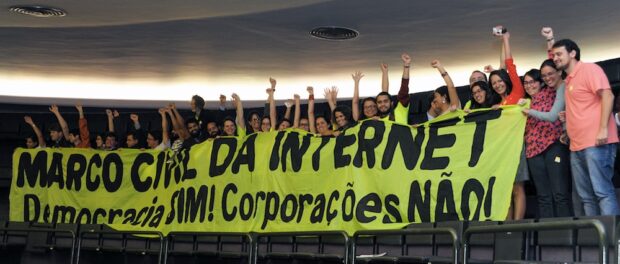
This article introduces a series by guest researcher Jeffrey Omari,* on ICTs in Rio’s favelas.
A resident of a North Zone favela told a story of how his landlord gave him notice to vacate his apartment and demanded he move out quickly. The resident had other housing options in the favela and was not too distraught. He was somewhat amused, however, when he mentioned that his landlord had sent him the notice through Facebook. According to him, receiving this type of formal correspondence through informal social networks such as Facebook is increasingly common in favelas throughout Rio.
The Internet has become an indispensable part of life in Rio’s favelas as much as it has anywhere else in the world. For residents of these communities, Internet access and its ability to further a more democratic society are vital for day-to-day living. Accordingly, the availability of the material technologies (namely desktop computers, laptops, tablets, mobile phones, or LAN houses) that facilitate access is essential for a broad range of social, cultural, financial, and political activities that govern life in the favela. The issue of access to technology in these communities is often overshadowed by the myriad concerns regarding the pacification initiatives. However, with Brazil recently passing the Marco Civil da Internet—an “Internet Bill of Rights”—issues of Internet access in favelas are starting to receive more attention.
Scholars from the Center for Technology and Society at Fundação Getúlio Vargas Law School originally conceived of the Marco Civil in 2009. It was made a constitutional priority by the Brazilian government after Edward Snowden’s disclosures regarding American espionage and was enacted into law in April 2014. The Marco Civil establishes rules on net neutrality, online privacy, data retention, and intermediary liability. Net neutrality—the idea that Internet servers handle different types of online traffic equally, without discrimination as to the speed of access (i.e., the way the Internet works now)—is guaranteed in Brazil under the 2014 law. This principle was only adopted in the U.S in 2015. With regards to online privacy, the Marco Civil establishes rules in three categories: (1) principles and user’s rights, (2) specifications on data retention, and (3) access to personal data. In an effort to ensure its own online privacy and escape the reach of the NSA spying campaign, Brazil is scheduled to begin construction on underwater fiber optic cables that would stretch across the Atlantic from Fortaleza to Portugal. Most importantly, however, for issues regarding technology in the favelas, the Marco Civil asserts that Internet access is a requisite for civil rights. Thus, in Brazil access to technology is fundamental to notions of democracy and civic participation, which inherently accompany civil rights.
The idea that access to technology is a right is expressed through the installation and use of gatos. Literally “cats” in Portuguese, in this context the term “gatos” is slang for the illegal siphoning of electricity, cable TV, or broadband Internet. This siphoning occurs through sophisticated wiring systems, which may be installed either by amateurs or commercially. In certain favelas, gatos are dropping in use due to police crackdowns and the increasing presence of Internet Service Providers (ISPs). Although many residents welcome the sight of the subscription-service ISPs in their communities, some favela residents long for the days of gatos, which amounted to subsidized service.
Recent studies have begun to shed more light on these concerns and others around access to technology in favelas. Observatório de Favelas, for example, published a quantitative study providing statistical data on how certain communities (Complexo do Alemão, Cidade de Deus, Rocinha, Manguinhos, and Complexo da Penha) in Rio use the Internet. Additionally, David Nemer, a PhD Candidate in Social Informatics at Indiana University, conducted ethnographic fieldwork on use of technology in the favelas of Vitória, Brazil and published Favela Digital: The Other Side of Technology in 2013.
Little ethnographic research, however, has been conducted on Internet access as a requisite for democracy. How is the material technology that facilitates social networks acquired or accessed by lower-income citizens? How does access to technology empower or disempower the residents of informal communities? In what ways does access to material technology also provide social currency? And what is the impact of LAN houses—cyber cafés used to promote digital inclusion by offering Internet access to favela dwellers? The forthcoming series of articles will provide a glimpse into these concerns in the context of the favelas of Rio de Janeiro.
*A PhD candidate from the University of California, Santa Cruz, Jeffrey Omari studies Internet access and cyber law in Rio de Janeiro.


